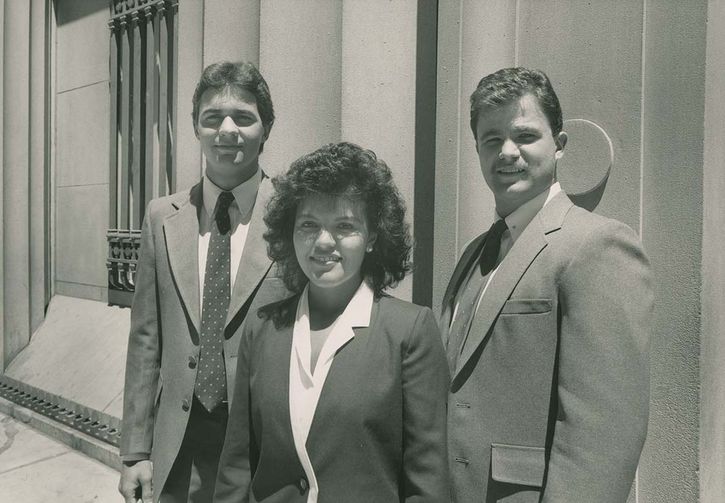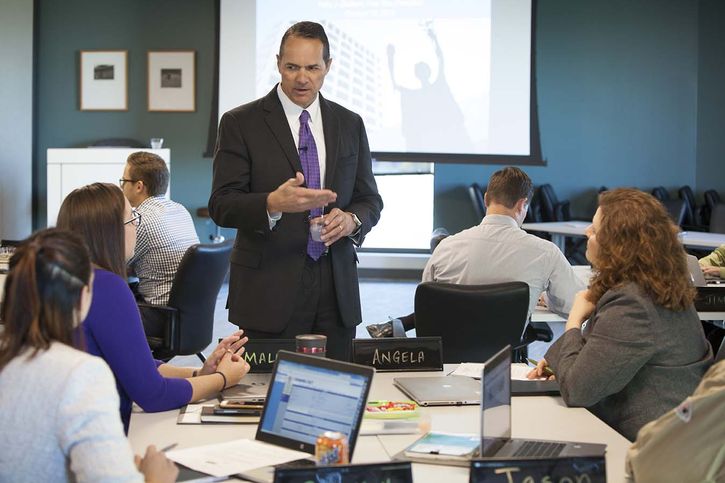After a career that spanned numerous leadership responsibilities—including serving as interim president for much of 2023—First Vice President and Chief Operating Officer Kelly Dubbert retired from the Kansas City Fed at the end of February. In addition to running operations at the Bank, Dubbert served in important leadership roles on the Federal Reserve System level. On March 1, he was succeeded as first vice president and COO by Kim Robbins.
A few weeks before his retirement, Dubbert took time to answer questions about his influential career, the Bank’s work, and what’s ahead for him.
1. You have continued to fulfill your many duties as first vice president since your retirement was announced in the fall of 2023. In general, what were these last several months like for you?
I’ve been busy with supporting the transition to Kim as the next first vice president and in looking to wrap up various System projects and commitments before I leave. I’m also enjoying the opportunity to extend my thanks to many who have mentored or supported me in my career, including directors, System leaders, Treasury officials, and Bank leaders and staff. Time is going by fast, and I know once retirement arrives it will be bittersweet, but I’m also leaving with great confidence in the future of the Bank given the strength of its ongoing performance and the quality of the leadership team and staff.

A June 1986 internal newsletter introduced new Bank employees (from left) Kelly Dubbert, Virginia Bellis and Rusty Klein.
2. Looking back to 1986, what attracted you to the Bank?
I was referred by a faculty member at Kansas State to interview for an internship program. While I had general “textbook knowledge” of the Fed, I had almost no knowledge of the responsibilities and work of staff at a Reserve Bank. But from the first interview, I was impressed with the quality of the people I was introduced to and intrigued by the mission and reputation of the Federal Reserve.
Even very early in my career I didn’t give much serious thought to other career opportunities. I felt challenged and rewarded at the Bank and, as I learned more and more about its mission and the impact of its work, I became convinced I would be very happy to spend my entire career with the Bank.
3. So much has changed since the 1980s. What were some memorable changes and challenges throughout your career?
It’s hard for me to pick which job was the most challenging, but certain roles stand out; moving to the Oklahoma City Branch and shortly after becoming branch manager; being asked to lead the Information Technology Division despite having no career background in IT; and certainly being selected as first vice president 12 years ago. Those and other assignment changes challenged me to stay committed to learning new things, helped me gain confidence in leading in different environments, and helped me understand the importance of focusing on developing staff and leaders.
4. You spent significant time at the Oklahoma City Branch, including serving as branch manager from 1996 to 2001.What are your thoughts on the importance of the three branches in the Tenth Federal Reserve District?
The role gave me a deep appreciation for the presence of the Federal Reserve throughout the country and how important our branch offices are to serving a large and economically diverse Tenth District. As branch manager, I spent extensive time and attention on the visibility of the branch and Bank within the region through contact with our board of directors, advisory groups, banking and business constituents, and through various community boards and leadership experiences.
The experience taught me how important it was to educate and engage the public regarding the mission of the Federal Reserve. I was also very proud to lead an Oklahoma City Branch team that consistently demonstrated excellence in operations.
5. You served as chair of the System Crisis Team during the COVID-19 pandemic, leading the entire System’s reaction to the crisis. What lessons were learned during that time and, years earlier, during the 9/11 aftermath?
I served as System Crisis Management Team (SCMT) chair during part of my three-year tenure as chair of the Conference of First Vice Presidents. As with many aspects of COVID, it was quite a learning process, but one in which some of the strongest aspects of System coordination across the Reserve Banks really shined. The challenge was in balancing what aspects of our COVID response and risk management needed to be highly uniform across the banks, and where did we need to leave decisions up to local bank management discretion. I was pleased with how both the bank presidents and first vice presidents allowed me to work through the SCMT and have broad discretion in managing the key areas requiring coordination.
This and other past experiences like 9/11 demonstrate just how important resilience planning and execution are to the continuity of our mission areas and key operations.
6. In the last year, you took on the interim role as president of the Bank following the retirement of Esther George. What were the significant challenges and accomplishments during this time?
I had to recognize that it just wasn’t possible to perform every aspect of both the interim president and first vice president roles, so I certainly had to prioritize and focus my attention. I also relied heavily on the experience and skills of the entire Management Committee to support me. I had the privilege of attending five Federal Open Market Committee meetings and received outstanding support from Joe Gruber (executive vice president) and the Economic Research team. I also focused attention on working with the Board of Directors and helping support the ongoing work of the Presidential Search Committee. Despite the challenges I faced in managing both roles, it was an honor and privilege to serve in the interim president role.
7. What impact did your roots in north-central Kansas have on your career journey?
For me, it was a great experience to grow up in a small town (Cawker City, Kansas, home of the world's largest ball of twine). My parents raised six kids (with me being the youngest) and instilled in us a strong work ethic and commitment to family and the local community. There are still times that I look back fondly on working on my dad’s and uncles’ farm, having the opportunity to play various sports and be active in Boy Scouts and other activities.
But I also learned how difficult it sometimes was for my parents to make ends meet and how much they emphasized the importance of a good education to open the door to opportunities. My siblings and I often talk about how fortunate we have been to have such great parents and a good family life. I just hope my commitment to the Bank and its people have shown that I learned some important lessons early in life.

Kelly Dubbert frequently spoke with employees during leadership training sessions, such as this one at the Bank's head office in 2021.
8. You have been a long-time supporter of the Bank’s mentor program. Were there mentors who helped you along your journey, and what advice would you share that might help others?
I’ve have been blessed to have so many strong mentors throughout my career, so it’s impossible to name them all. But I’ve been particularly pleased that two strong mentors, Rich Rasdall, former FVP, and Esther George, have been able to attend some of my retirement events. Rich was not only a strong mentor through most of my career, but he conducted my first interview (along with former officer Harold Shewmaker) And Esther of course was a great mentor and partner as we served together as president and first vice president for 11 years. Both Rich and Esther and a long list of other mentors instilled in me the importance of developing leadership and staff, always striving to ensure the Bank has a deep pool of talent to meet current and future needs.
So, the announcement of Kim as the Bank’s next first vice president has been very gratifying for me and many others who recognize the Bank’s long-term commitment to developing outstanding leaders.
9. What are your final thoughts for Kansas City Fed employees of the Tenth District?
To all our employees, a word of personal thanks and gratitude for your service and commitment to the mission of the Bank. In my many opportunities to represent the Bank within the System and externally, it has always been an honor and pleasure to speak to and witness the excellence with which you have performed your work. And thank you for the many opportunities to meet with you and hear your feedback and support, from one-on-one meetings to all-employee town halls. I have benefitted greatly from your support in both good and challenging times.
10. On a personal note, how will you spend your time in retirement? With the presumption that time with your grandchildren might be at the top of your list, what other plans are on your agenda?
Yes, time with family will certainly be at the top of my list. But I expect to be busy doing a variety of things, including travel, hobbies, and finding ways to give back. I may take a few weeks to just relax at the start…reading a few newspapers front to back is something I always enjoy, but rarely accomplish! And I also expect to stay informally connected to the Bank and look forward to watching its continued success in the years ahead.
Learn more about the Bank's officers and other leadership roles.
